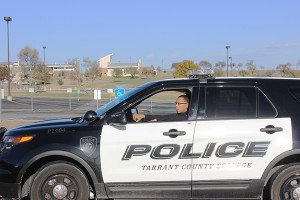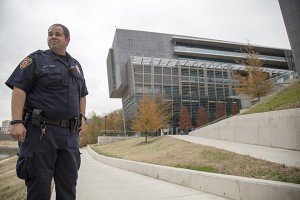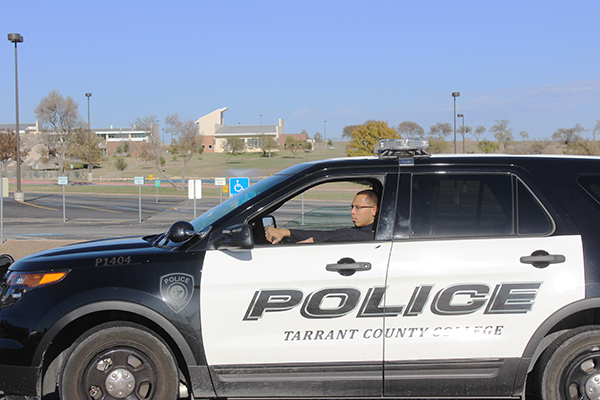
Photo by Matt Koper/The Collegian
By Matt Koper/ne news editor
NW police officer Leonard Jessie approached a student sitting in the hallway to ask how he was doing. A simple question, and he received a simple answer: “Good.”
Earlier in the semester, Jessie had consoled the student when he had seen him visibly upset after a romantic breakup.
Not typical police work but it showed the compassion the officer has for his job and also for the students.
Officers such as Jessie and Thomas Gilbert, who works on TRE, try to provide the safest and most secure learning environment possible for all students.
In 2009-2010, TCC had a total of 72 sworn officers on campuses throughout the entire district and 16 security guards used on various campuses. Today, the district has 84 officers and 14 security guards. The department drives 23 Ford Explorers for patrol duties, four as security vehicles and the rest for police duties.
The campus officers’ responsibilities change from day to day with emphasis placed on patrolling buildings and parking lots.
“I try to vary my foot patrol route as often as I can,” Gilbert said. “You don’t want to be predictable to where people know exactly where you are at a certain time.”
The officers also help out in other ways, whether it’s jump-starting cars, unlocking doors or answering students’ questions.
“Our job is to make sure the campus experience is the best it can be. That means we assist anyway we can,” Jessie said.
The officers help provide a visible presence and make themselves known, Gilbert said.

Photo by Eric Rebosio/The Collegian
“You don’t have to pull people over or write tickets although that’s part of the job,” he said. “Merely just being friendly and walking around makes a difference.”
A peace officer commissioned in Texas is required to complete a minimum of 40 hours of training every two years, including welfare training, defensive tactics, updates on laws and procedures and CPR certification.
“Our department believes in training our officers to keep them sharp. You have to know the law to be able to enforce it,” Jessie said.
While no day or night could be called typical in a campus police officer’s job, recent ride-alongs with two officers provide a glimpse at how these law enforcement authorities try to protect and serve all five TCC campuses.
Jessie switched throughout the day from patrolling across NW Campus on foot to driving in his police SUV. Calling in his position via radio or the computer module in his patrol car helps the department keep track of where officers are while they are on patrol.
Jessie has been a police officer for a year and a half, moving from the copy center on South because he “wanted something different.”
On his foot patrol, Jessie greeted students with a “How are you doing?” or “Is everything OK?”
“The way you approach students, if you are positive, you tend to get the same reaction back,” he said.
Police work runs in his family — a brother is a Fort Worth police officer — and this was evident in the way he interacted with students, fellow officers and faculty on his patrol — it seemed so natural and effortless.
When night fell, the focus shifted to driving around the parking lot and checking to make sure building doors were secure and no suspicious activity was taking place. He was even called to unlock a door for a teacher in the Academic Building.
“A lot of people don’t know what we are doing because it is so quiet,” he said.
On top of spending eight hours on duty, the married father of four daughters is also a background investigator running checks on potential candidates for the police academy. He checks into candidates’ background history, including arrest records, financial information and so on to help the department determine if the candidate is fit to be an officer.
In addition, he plans on restarting and repacking the D.A.R.E. (Drug Abuse Resistance Education) program in elementary schools such as John T. White in Fort Worth with his younger brother with the Fort Worth police.
“I want to recondition kids that live in a bad environment,” he said. “I grew up in the Stop 6 Projects in Fort Worth, so I know what it’s like. Elementary schools are the target age because that is when kids are most influenced by what they see and can develop negative views against police officers.”
Gilbert also varied his patrol by starting on foot and switching to a vehicle to patrol the TXU building on North Main Street in downtown Fort Worth.
He is a lifelong public servant, starting at the age of 18 as a hose-dragger for a fire department in Indiana.
“I had this desire to help people,” he said. “It didn’t matter whether it was with the fire department, EMS or law enforcement. I wanted to help.”
Gilbert also worked for the sheriff’s office in Tarrant County for four years but left because the environment was negative.
“It’s a jail so no one wanted to be there. Here (TRE), you enjoy community partnerships and people appreciate you for your work,” he said.
Gilbert patrolled as far down as the Franklin Street path that connects TRE to TR. He also makes it a point to stop by the place named the “Snakehouse,” where homeless people sometimes stay, to check and make sure they are all right.
His police work is also a family affair with his fiancée working for the Sheriff’s Office as a classification officer, asking inmates a series of background questions to determine their location of housing.
On his own rounds, Gilbert made sure doors and emergency exits were closed throughout TRE. He would get calls if they were not.
“I’ve never been somewhere where people are so willing to help,” he said. “We get calls all the time from students for even something as simple as a smoking violation. It’s great. People are not afraid to ask us for help.”
He also stressed the importance of patrolling the parking lot since TRE is in downtown Fort Worth and student-staff parking is limited.
“Parking issues are a lot of what we see,” he said. “So we make it a point to talk to classes to make sure they are following parking rules.”
At the end of his foot patrol route, Gilbert mentioned the importance of being seen as a police officer and its relationship to the area he covers.
“Just patrolling and interacting does more for police work than anything else will,” he said. “Establishing relationships with the community is something you just cannot buy.”

